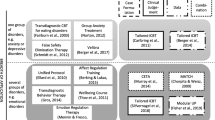Abstract
Metamotivation Therapy targets motivational deficits in severe mental illness (SMI) by using the novel approach of enhancing meta-motivation and executive functioning skills. The current naturalistic, uncontrolled cohort study provides the rational for the Metamotivation Therapy approach and program evaluation data on pilot feasibility and efficacy. Pilot feasibility was assessed through utilization data and Client Satisfaction Survey (CSS-8). Pilot effectiveness was assessed using the Barkley Deficits in Executive Functioning for Adults and Quality of Life Enjoyment and Satisfaction Questionnaire. On average, participants completed 15/20 sessions; nine participants (9.4%) dropped out before four sessions. 90.5% of the 28 people providing satisfaction ratings expressed some level of satisfaction. Metamotivation Therapy participants who completed both baseline and follow up measures (n = 38) showed an improvement from baseline to follow-up on overall executive functioning, self-motivation, and quality of life. Given the results, a randomized controlled trial is warranted to optimize dosage and assess efficacy.

Similar content being viewed by others
References
Barkley, R. A. (2011). Barkley deficits in executing functioning scale (BDEFS). Guilford Press.
Bloemen, A. J. P., Oldehinkel, A. J., Laceulle, O. M., Ormel, J., Rommelse, N. N. J., & Hartman, C. A. (2018). The association between executive functioning and psychopathology: general or specific? Psychological Medicine, 48(11), 1787–1794. https://doi.org/10.1017/S0033291717003269
Bos, D. J., Silver, B. M., Barnes, E. D., Ajodan, E. L., Silverman, M. R., Clark-Whitney, E., & Jones, R. M. (2019). Adolescent-specific motivation deficits in autism versus typical development. Journal of Autism and Developmental Disorders. https://doi.org/10.1007/s10803-019-04258-9
Calabrese, J. R., Fava, M., Garibaldi, G., Grunze, H., Krystal, A. D., Laughren, T., & Tohen, M. (2014). Methodological approaches and magnitude of the clinical unmet need associated with amotivation in mood disorders. Journal of Affective Disorders, 168, 439–451. https://doi.org/10.1016/j.jad.2014.06.056
Chase, T. N. (2011). Apathy in neuropsychiatric disease: diagnosis, pathophysiology, and treatment. Neurotoxicity Research, 19(2), 266–278. https://doi.org/10.1007/s12640-010-9196-9
Cohen, J. (1992). A power primer. Psychological Bulletin, 112(1), 155–159
Dixon, L. B., Holoshitz, Y., & Nossel, I. (2016). Treatment engagement of individuals experiencing mental illness: review and update. World Psychiatry, 15(1), 13–20
Endicott, J., Nee, J., Harrison, W., & Blumenthal, R. (1993). Quality of life enjoyment and satisfaction questionnaire: A new measure. Psychopharmacolgy Bulletin, 29(2), 321–326
Faerden, A., Friis, S., Agartz, I., Barrett, E. A., Nesvag, R., Finset, A., & Melle, I. (2009). Apathy and functioning in first-episode psychosis. Psychiatric Services, 60(11), 1495–1503. https://doi.org/10.1176/appi.ps.60.11.1495
Frese, F. J., 3rd., Knight, E. L., & Saks, E. (2009). Recovery from schizophrenia: with views of psychiatrists, psychologists, and others diagnosed with this disorder. Schizophrenia Bulletin, 35(2), 370–380. https://doi.org/10.1093/schbul/sbn175
Kamradt, J. M., Nikolas, M. A., Burns, G. L., Garner, A. A., Jarrett, M. A., Luebbe, A. M., & Becker, S. P. (2019). Barkley deficits in executive functioning scale (bdefs): validation in a large multisite college sample. Assessment. https://doi.org/10.1177/1073191119869823
Larsen, D. L., Attkisson, C. C., Hargreaves, W. A., & Nguyen, T. D. (1979). Assessment of client/patient satisfaction: development of a general scale. Evalulation and Program Planning, 2(3), 197–207
Lopez-Vergara, H. I., & Colder, C. R. (2013). An examination of the specificity of motivation and executive functioning in ADHD symptom-clusters in adolescence. Journal of Pediatric Psychology, 38(10), 1081–1090. https://doi.org/10.1093/jpepsy/jst050
Martinez-Camarillo, S., Yoldi-Negrete, M., Fresan-Orellana, A., Ortega-Ortiz, H., & Becerra-Palars, C. (2019). Work motivation in patients with bipolar disorder: Associated factors. International Journal of Social Psychiatry, 65(4), 300–304. https://doi.org/10.1177/0020764019842270
Medalia, A., & Freilich, B. (2008). The Neuropsychological Educational Approach to Cognitive Remediation (NEAR) model: practice principles and outcome studies. American Journal of Psychiatric Rehabilitation, 11(2), 123–143
Medalia, A., & Brekke, J. (2010). In search of a theoretical structure for understanding motivation in schizophrenia. Schizophrenia Bulletin, 36(5), 912–918
Miele, D. B., & Scholer, A. A. (2018). The role of metamotivational monitoring in motivation regulation. Educational Psychologist, 53(1), 1–21
Miele, D. B., Scholer, A. A., & Fujita, K. (2020). Metamotivation: Emerging research on the regulation of motivational states. In Advances in Motivation Science (Vol. 7, pp. 1–42). Elsevier.
Millan, M. J., Agid, Y., Brüne, M., Bullmore, E. T., Carter, C. S., Clayton, N. S., & Dubois, B. (2012). Cognitive dysfunction in psychiatric disorders: characteristics, causes and the quest for improved therapy. Nature reviews Drug discovery, 11(2), 141
Rollnick, S., Butler, C. C., Kinnersley, P., Gregory, J., & Mash, B. (2010). Motivational interviewing. British Medical Journal, 340, c1900. https://doi.org/10.1136/bmj.c1900
Scholer, A. A., & Miele, D. B. (2016). The role of metamotivation in creating task-motivation fit. Motivation Science, 2(3), 171–197
Stevanovic, D. (2011). Quality of Life Enjoyment and Satisfaction Questionnaire–short form for quality of life assessments in clinical practice: a psychometric study. Journal of Psychiatric and Mental Health Nursing, 18(8), 744–750
Strauss, G. P., Horan, W. P., Kirkpatrick, B., Fischer, B. A., Keller, W. R., Miski, P., & Carpenter, W. T., Jr. (2013). Deconstructing negative symptoms of schizophrenia: avolition-apathy and diminished expression clusters predict clinical presentation and functional outcome. Journal of Psychiatric Research, 47(6), 783–790. https://doi.org/10.1016/j.jpsychires.2013.01.015
Van Blerkom, D. L. (2011). College study skills: Becoming a strategic learner. Cengage Learning.
Vergara-Lopez, C., Lopez-Vergara, H. I., & Colder, C. R. (2013). Executive functioning moderates the relationship between motivation and adolescent depressive symptoms. Personality and Individual Differences, 54(1), 18–22. https://doi.org/10.1016/j.paid.2012.07.034
Acknowledgements
We thank the Metamotivation Therapy clinicians and participants for their efforts to improve the quality of the Metamotivation Therapy program.
Funding
The Pibly Fund provided funding support to MH and DL for this project. The Essel Foundation provides funding to the clinic to support program development and evaluation.
Author information
Authors and Affiliations
Corresponding author
Ethics declarations
Conflict of interest
All authors declare no competing interests.
Additional information
Publisher's Note
Springer Nature remains neutral with regard to jurisdictional claims in published maps and institutional affiliations.
Rights and permissions
About this article
Cite this article
Hansen, M.C., Gertmenian, E., Lynch, D. et al. Metamotivation Therapy: Is it time to Focus on Metamotivation in Severe Mental Illness?. J Contemp Psychother 51, 295–301 (2021). https://doi.org/10.1007/s10879-021-09502-x
Accepted:
Published:
Issue Date:
DOI: https://doi.org/10.1007/s10879-021-09502-x




